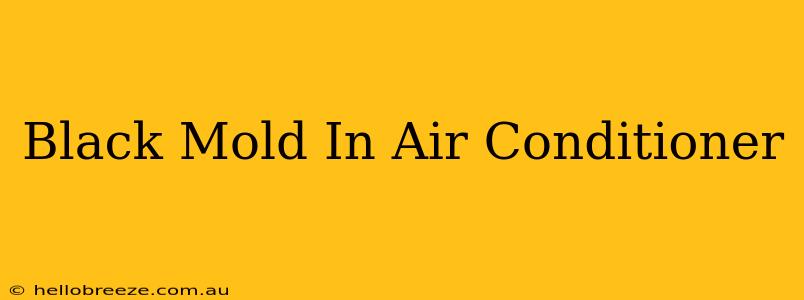Is your air conditioner emitting a musty odor? Do you see dark, slimy patches inside the unit? You might have a black mold problem. This isn't just an unpleasant sight; black mold in air conditioners poses a serious health risk. This comprehensive guide will walk you through identifying, removing, and preventing black mold in your AC unit, ensuring cleaner, healthier air in your home.
Identifying Black Mold in Your Air Conditioner
Black mold, often Stachybotrys chartarum, thrives in damp, dark environments—making air conditioners a perfect breeding ground. While not all dark spots are mold, several key indicators can help you identify a black mold infestation:
- Appearance: Black mold typically appears as dark, slimy patches or spots, often with a fuzzy or velvety texture. It can range in color from dark green to black.
- Odor: A musty, earthy, or mildew-like smell emanating from your air conditioner is a strong indicator of mold growth.
- Location: Check the evaporator coil, drain pan, and air filters for signs of mold. These areas are particularly prone to moisture buildup.
Differentiating Black Mold from Other Substances
It's crucial to distinguish black mold from other substances that might look similar. For instance, dirt or dust can appear dark, but they lack the slimy texture and distinct odor of mold. If you're unsure, it's best to err on the side of caution and assume it's mold.
Dangers of Black Mold in Air Conditioners
Ignoring black mold in your air conditioner can have serious health consequences. Inhaling mold spores can trigger:
- Allergies: Mold can exacerbate allergy symptoms like sneezing, coughing, and itchy eyes.
- Respiratory Problems: Exposure to black mold can lead to asthma attacks, bronchitis, and other respiratory illnesses.
- Other Health Issues: In some cases, severe mold exposure can cause more serious health problems, particularly in individuals with weakened immune systems.
Removing Black Mold from Your Air Conditioner
Removing black mold requires caution and proper safety measures. Never attempt to clean black mold without appropriate protection.
Safety Precautions:
- Wear protective gear: This includes a respirator (N95 or better), gloves, and eye protection.
- Ventilate the area: Open windows and doors to improve air circulation.
- Dispose of contaminated materials properly: Seal moldy materials in plastic bags before discarding them.
Cleaning Steps:
- Turn off the AC unit: Disconnect the power supply before attempting any cleaning.
- Remove and clean the air filter: Wash or replace the filter according to the manufacturer's instructions.
- Clean the evaporator coil and drain pan: Use a solution of warm water and mild detergent to gently scrub away mold. You may need a brush or cleaning solution specifically designed for this purpose. Rinse thoroughly with clean water.
- Dry thoroughly: Allow the unit to dry completely before turning it back on. A fan can help speed up the drying process.
For extensive or persistent mold infestations, professional cleaning is recommended.
Preventing Black Mold in Your Air Conditioner
Prevention is key to avoiding black mold in your AC unit. These steps can help:
- Regular maintenance: Clean or replace the air filter every month, or as recommended by the manufacturer.
- Check the drain pan: Ensure the drain pan is clean and free of debris.
- Proper ventilation: Ensure adequate ventilation in the area surrounding the air conditioner.
- Address leaks promptly: Repair any leaks in the unit or surrounding area as quickly as possible.
- Regular professional service: Schedule annual professional maintenance to identify and address potential mold issues before they become major problems.
By following these steps, you can minimize the risk of black mold in your air conditioner and enjoy cleaner, healthier air in your home. Remember, early detection and prompt action are crucial for preventing serious health issues. If you're unsure about handling mold yourself, consulting a professional HVAC technician is always recommended.

